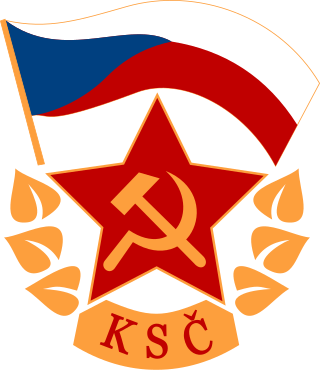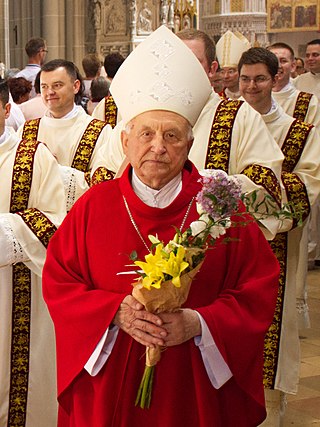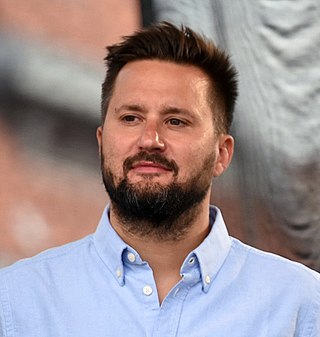
The Armed Forces of the Slovak Republic were divided from the Czechoslovak Army after dissolution of Czechoslovakia on 1 January 1993. Slovakia joined NATO on 29 March 2004. From 2006 the army transformed into a fully professional organization and compulsory military service was abolished. Slovak armed forces numbered 19,500 uniformed personnel and 4,208 civilians in 2022.

Trnava is a city in western Slovakia, 47 km (29 mi) to the northeast of Bratislava, on the Trnávka river. It is the capital of the Trnava Region and the Trnava District. It is the seat of a Roman Catholic archbishopric. The city has a historic center. Because of the many churches within its city walls, Trnava has often been called "Little Rome", or more recently, the "Slovak Rome".

The Communist Party of Czechoslovakia was a communist and Marxist–Leninist political party in Czechoslovakia that existed between 1921 and 1992. It was a member of the Comintern. Between 1929 and 1953, it was led by Klement Gottwald. The KSČ was the sole governing party in the Czechoslovak Socialist Republic though it was a leading party along with the Slovak branch and four other legally permitted non-communist parties. After its election victory in 1946, it seized power in the 1948 Czechoslovak coup d'état and established a one-party state allied with the Soviet Union. Nationalization of virtually all private enterprises followed, and a command economy was implemented.

The Movement for a Democratic Slovakia, later known as the People's Party – Movement for a Democratic Slovakia, was a populist political party in Slovakia. The party is commonly considered as having been authoritarian and illiberal.

Hlohovec, is a town in southwestern Slovakia, with a population of 21,508.

Monsignor Alojz Tkáč was a Slovak Roman Catholic prelate. He was the bishop of Košice from 1990 to 1995, the first archbishop of the Roman Catholic Archdiocese of Košice from 1995 to 2010 and archbishop emeritus until his death.
Dušan Tittel is a Slovak politician and former professional footballer who played as a defender. At international level, he represented Czechoslovakia and Slovakia. He was elected Slovakia Player of the Year three times.
Institute of Political Science of the Slovak Academy of Sciences is a research institute of the Slovak Academy of Sciences.

The National Memory Institute is a Slovak public institution that holds the police records of the fascist Slovak State and communist Czechoslovak Socialist Republic regimes that ruled Slovakia during the twentieth century. The institute also promotes research into these periods of Slovak history and educates the general public of this history. It publishes a journal, Pamäť národa, which is currently edited by Róbert Letz. The founder of the institute was Ján Langoš, who served as director until his death in a car crash in 2006.

"Študentská láska" is a song by the female singer Marika Gombitová released on OPUS in 1978.

The solo discography of Slovak recording artist Miroslav Žbirka consists of fourteen studio albums, five export releases, eight compilations, one live recording, one extended play and twelve official singles. As a member of Modus, Žbirka contributed to two albums of the group, as well as a number of singles issued from 1967 until 1980.
The 4th OTO Awards, honoring the best in Slovak popular culture for the year 2003, took time and place on January 31, 2004, at the Reduta concert hall in Bratislava. Unlike the previous editions of the show, the ceremony broadcast live JOJ. The host of the show, for a change, was actor Maroš Kramár.
The 13th OTO Awards, honoring the best in Slovak popular culture for the year 2012, took time and place on March 16, 2013 on the New Opera stage of the Slovak National Theater in Bratislava. The ceremony broadcast live RTVS on Jednotka, the hosts of the show were Adela Banášová and Matej "Sajfa" Cifra.
Institute of Inorganic Chemistry Slovak Academy of Sciences belongs to Scientific Section 2, Biological and Chemical Sciences of Slovak Academy of Sciences.

Matúš Vallo is a Slovak politician, architect, urban activist, musician, and the current Mayor of Bratislava. He was elected in 2018 with 36.5% of the vote as an independent politician, and re-elected in 2022 with 60.2% of the vote backed by his own local party Team Bratislava as well as Sloboda a Solidarita and Progresívne Slovensko.
In the run up to the 2023 Slovak parliamentary election, various organisations carried out opinion polling to gauge voting intention in Slovakia. Results of such polls are displayed in this article. The date range for these opinion polls are from the previous parliamentary election, held on 29 February 2020, to September 30th, 2023.

Simona Petrík is a Slovak politician who served as a member of the National Council of Slovakia from 2016–2020 and is serving again from 2023.
Events in the year 2023 in Slovakia.
Rudolf Hrubý was a Slovak businessman and investor. He was a co-founder and long-term CFO of the software company ESET.












